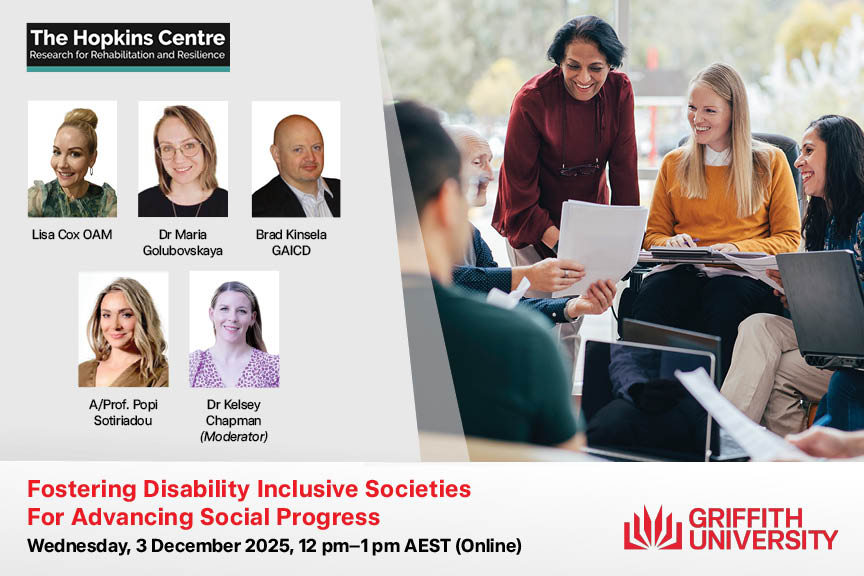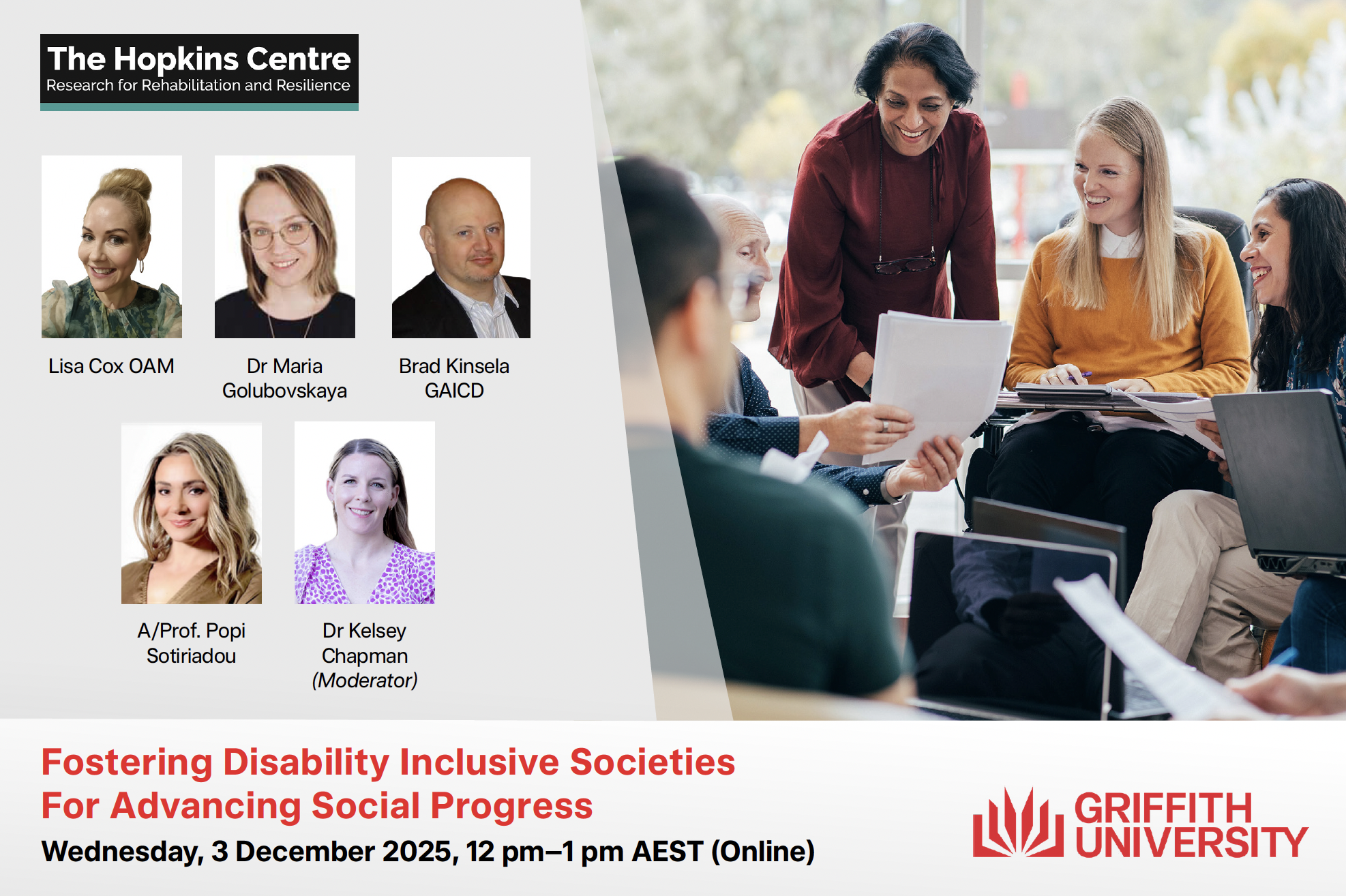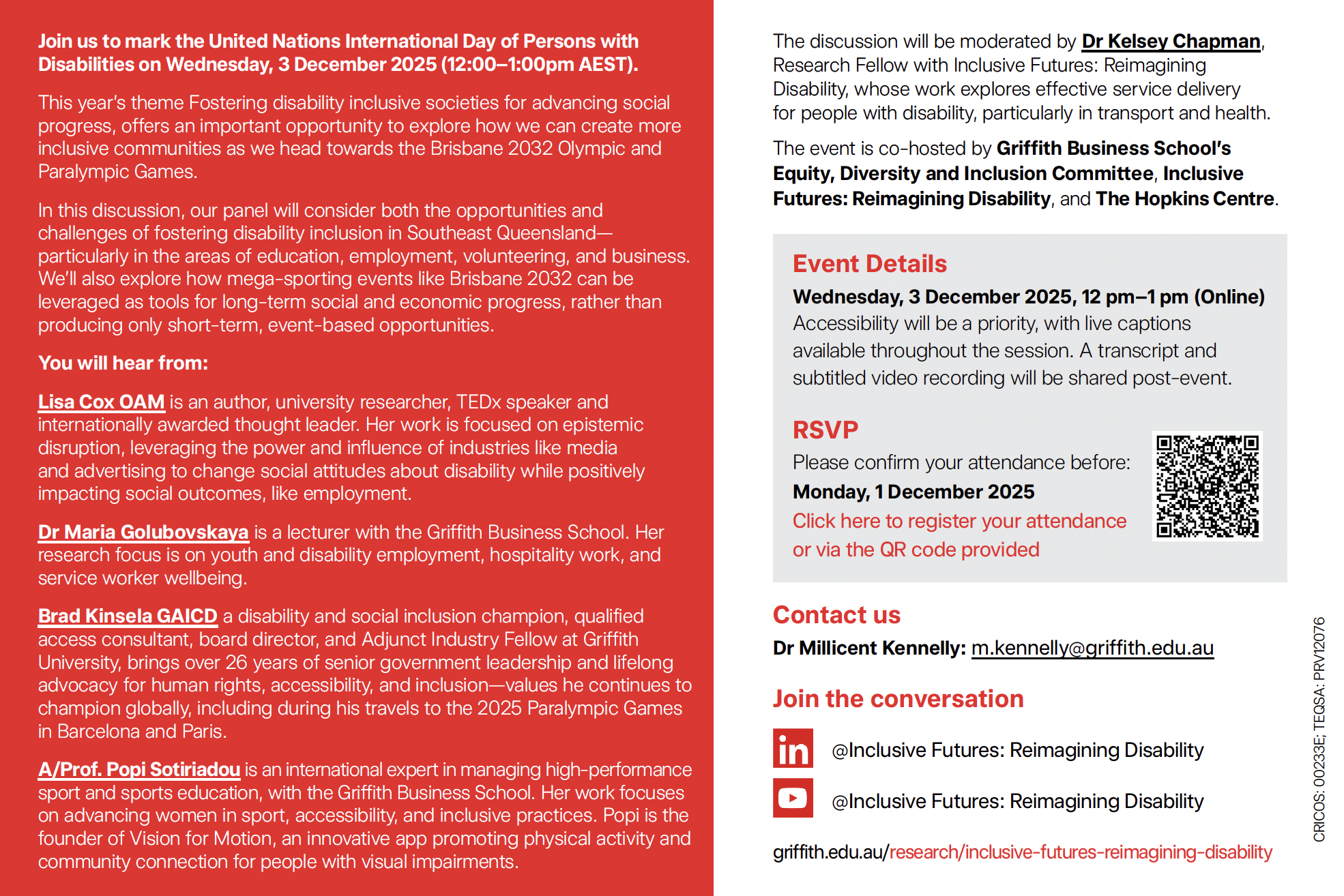Category Popi Sotiriadou Show all
-
IDPwD 2025: Fostering disability-inclusive societies for advancing social progress (online panel)
Share IDPwD 2025: Fostering disability-inclusive societies for advancing social progress (online panel) on Facebook Share IDPwD 2025: Fostering disability-inclusive societies for advancing social progress (online panel) on Twitter Share IDPwD 2025: Fostering disability-inclusive societies for advancing social progress (online panel) on Linkedin Email IDPwD 2025: Fostering disability-inclusive societies for advancing social progress (online panel) link
Post-IDPwD 2025 Wrap-Up

Thank you to everyone who joined us to mark International Day of People with Disability (IDPwD 2025). Our online forum—co-hosted by The Hopkins Centre, Inclusive Futures: Reimagining Disability, and the Griffith Business School—brought together an outstanding panel: Lisa Cox OAM, Dr Maria Golubovskaya, Brad Kinsela GAICD and A/Prof Popi Sotiriadou, moderated by Dr Kelsey Chapman.
Our speakers unpacked this year’s theme, Fostering disability-inclusive societies for advancing social progress, exploring opportunities for education, employment, business and community inclusion as we look ahead to Brisbane 2032.
If you missed the event, you can now watch the accessible recording and read the full transcript: https://youtu.be/1CtIb3MjHd0?si=dwtxovMtF3_I4Ffl
We also invite you to explore our HDR Scholars with Disability blog, showcasing lived-experience research shaping more inclusive futures at Griffith. https://inclusivefutures.griffith.edu.au/news/news_feed/idpwd-celebrating-our-griffith-university-hdr-disability-scholars
👉 View the video, transcript, and event recap: https://www.hopkinscentre.edu.au/news-view/international-day-of-persons-with-disabilities-538
More information:
Inclusive Futures: Reimagining Disability
inclusivefutures@griffith.edu.auFostering disability inclusive societies
for advancing social progressJoin us to mark the United Nations International Day of Persons with Disabilities on Wednesday, 3 December 2025 (12:00–1:00pm AEST) in our online forum hosted by Griffith Business School’s Equity, Diversity and Inclusion Committee, Inclusive Futures Reimagining Disability, and The Hopkins Centre.
This year’s theme Fostering disability inclusive societies for advancing social progress, offers an important opportunity to explore how we can create more inclusive communities as we head towards the Brisbane 2032 Olympic and Paralympic Games.
In Australia, one in five people experience disability and related barriers to meaningful employment. In this discussion, our panel will consider both the opportunities and challenges of fostering disability inclusion in Southeast Queensland—particularly in the areas of education, employment, volunteering, and business. We’ll also explore how mega-sporting events like Brisbane 2032 can be leveraged as tools for long-term social and economic progress, rather than producing only short-term, event-based opportunities.
You will hear from:
Lisa Cox OAM is an author, university researcher, TEDx speaker and internationally awarded thought leader. Her work is focused on epistemic disruption, leveraging the power and influence of industries like media and advertising to change social attitudes about disability while positively impacting social outcomes, like employment.
Dr. Maria Golubovskaya, Lecturer, Griffith Business School – researching youth and disability employment, hospitality work, and service worker wellbeing.
Brad Kinsela GAICD brings an extensive background as disability and social inclusion champion, qualified access consultant and board member/company director, Adjunct Industry Fellow at Griffith University, as well as an extensive career as a 'former' senior executive in the Government for over 26 years, including the Games Independent Infrastructure and Coordination Authority. Coming from a background of disability and human rights advocacy, lobbying, and community-based human services and practice, it is not surprising that Brad has maintained his connections, profile, and commitment to living in a society that values, services and embraces all members of communitySeparate from his public policy life, his love for family and friends and embracing the outdoor wonders of the world has seen Brad take his passion to have accessibility and inclusion as the 'norm' rather than the exception has taken him to many places, most notably Barcelona and Paris in 2025 during the Paralympic Games.
Associate Professor Popi Sotiriadou is a lecturer and researcher with the Griffith Business School and a distinguished international expert in managing high-performance sport and sports education. Her work focuses particularly on advancing women in sport, accessibility, and inclusive practices that ensure equitable participation and representation. Popi is the founder of Vision for Motion, an innovative app that promotes physical activity, wellbeing, and community connection for people with visual impairments.
The discussion will be moderated by Dr Kelsey Chapman, Research Fellow with Inclusive Futures: Reimagining Disability, whose work explores effective service delivery for people with disability, particularly in transport and health.
Accessibility will be a priority, with live captions available throughout the session. This event will also be recorded and shared post-event, along with a full transcript for those who could not attend via YouTube and our website.
More information
Inclusive Futures: Reimagining Disability
inclusivefutures@griffith.edu.auDr Millicent Kennelly – Griffith Business School
m.kennelly@griffith.edu.au -
IDPwD Panel Discussion: Fostering disability inclusive societies for advancing social progress
Share IDPwD Panel Discussion: Fostering disability inclusive societies for advancing social progress on Facebook Share IDPwD Panel Discussion: Fostering disability inclusive societies for advancing social progress on Twitter Share IDPwD Panel Discussion: Fostering disability inclusive societies for advancing social progress on Linkedin Email IDPwD Panel Discussion: Fostering disability inclusive societies for advancing social progress link

Join us to mark the United Nations International Day of Persons with Disabilities on Wednesday, 3 December 2025 (12:00–1:00pm AEST) in our online forum hosted by Griffith Business School’s Equity, Diversity and Inclusion Committee, Inclusive Futures Reimagining Disability, and The Hopkins Centre.
This year’s theme Fostering disability inclusive societies for advancing social progress, offers an important opportunity to explore how we can create more inclusive communities as we head towards the Brisbane 2032 Olympic and Paralympic Games.
In Australia, one in five people experience disability and related barriers to meaningful employment. In this discussion, our panel will consider both the opportunities and challenges of fostering disability inclusion in Southeast Queensland—particularly in the areas of education, employment, volunteering, and business. We’ll also explore how mega-sporting events like Brisbane 2032 can be leveraged as tools for long-term social and economic progress, rather than producing only short-term, event-based opportunities.
You will hear from:
Lisa Cox OAM is an author, university researcher, TEDx speaker and internationally awarded thought leader. Her work is focused on epistemic disruption, leveraging the power and influence of industries like media and advertising to change social attitudes about disability while positively impacting social outcomes, like employment.
Dr. Maria Golubovskaya, Lecturer, Griffith Business School – researching youth and disability employment, hospitality work, and service worker wellbeing.
Brad Kinsela GAICD brings an extensive background as disability and social inclusion champion, qualified access consultant and board member/company director, Adjunct Industry Fellow at Griffith University, as well as an extensive career as a 'former' senior executive in the Government for over 26 years, including the Games Independent Infrastructure and Coordination Authority. Coming from a background of disability and human rights advocacy, lobbying, and community-based human services and practice, it is not surprising that Brad has maintained his connections, profile, and commitment to living in a society that values, services and embraces all members of communitySeparate from his public policy life, his love for family and friends and embracing the outdoor wonders of the world has seen Brad take his passion to have accessibility and inclusion as the 'norm' rather than the exception has taken him to many places, most notably Barcelona and Paris in 2025 during the Paralympic Games.
Associate Professor Popi Sotiriadou is a lecturer and researcher with the Griffith Business School and a distinguished international expert in managing high-performance sport and sports education. Her work focuses particularly on advancing women in sport, accessibility, and inclusive practices that ensure equitable participation and representation. Popi is the founder of Vision for Motion, an innovative app that promotes physical activity, wellbeing, and community connection for people with visual impairments.
The discussion will be moderated by Dr Kelsey Chapman, Research Fellow with Inclusive Futures: Reimagining Disability, whose work explores effective service delivery for people with disability, particularly in transport and health.
Accessibility will be a priority, with live captions available throughout the session. This event will also be recorded and shared post-event, along with a full transcript for those who could not attend via YouTube and our website.
👉 Register now to be part of this important conversation: https://shorturl.at/Nx5Qk
More information
Inclusive Futures: Reimagining Disability
inclusivefutures@griffith.edu.auDr Millicent Kennelly – Griffith Business School
m.kennelly@griffith.edu.au
-
International Day of People with Disability – Empowering Tomorrow: Inclusive Futures researchers unite to rescue and achieve the UN Sustainable Development Goals (Part 2)
Share International Day of People with Disability – Empowering Tomorrow: Inclusive Futures researchers unite to rescue and achieve the UN Sustainable Development Goals (Part 2) on Facebook Share International Day of People with Disability – Empowering Tomorrow: Inclusive Futures researchers unite to rescue and achieve the UN Sustainable Development Goals (Part 2) on Twitter Share International Day of People with Disability – Empowering Tomorrow: Inclusive Futures researchers unite to rescue and achieve the UN Sustainable Development Goals (Part 2) on Linkedin Email International Day of People with Disability – Empowering Tomorrow: Inclusive Futures researchers unite to rescue and achieve the UN Sustainable Development Goals (Part 2) link
Join us as we celebrate International Day of People with Disability (IDPwD)!
This week, on 3 December, we acknowledge IDPwD, a significant day recognised by the United Nations. The IDPwD program aligns with Australia’s Disability Strategy 2021-31 and aims to increase public awareness, understanding and acceptance of people with disability. The United Nations Theme for IDPwD 2023 is ‘United in action to rescue and achieve the Sustainable Development Goals (SDGs) for, with and by persons with disabilities.’
Inclusive Futures: Reimagining Disability – the Griffith University disability research beacon, addresses the core United Nations principle of Leave No-one Behind that underpins all 17 Sustainable Development Goals. We reduce inequalities through partnerships with community and industry to provide inclusive infrastructure and innovation that can improve quality of life for people with disability.
Inclusive Futures: Reimagining Disability draws on dozens of research experts who specialise in disability across all stages of life and societal levels. They bring expertise in all types of disabilities, chronic conditions and a wide array of methods and practices.
To mark this occasion, we shine a spotlight on researchers and projects dedicated to uniting in action, striving to achieve the Sustainable Development Goals for, with and by persons with disability.
 Gold Coast Titans LeagueAbility participants and A/Professor Popi Sotiriadou (inset)
Gold Coast Titans LeagueAbility participants and A/Professor Popi Sotiriadou (inset)Researcher Spotlight: A/Professor Popi Sotiriadou, Associate Professor of Sport Management (SFHEA)
Associate Professor Popi Sotiriadou is a distinguished international expert in the field of “Managing High Performance Sport” and is a true pioneer in “Sports Education”.
To Popi, the “International Day of People with Disability represents a moment to celebrate achievements, raise awareness, advocate for change, and reinforce the commitment to creating a more inclusive and accessible society.”
“My research provides evidence that informs the development of policies and advocacy efforts aimed at improving the rights and well-being of people with disability. This relates to accessibility, employment, education, and healthcare. Also, it contributes to the development of accessible technologies, infrastructure, and environments through the promotion of universal design principles. This enhances accessibility and usability for individuals with diverse abilities.”
LeagueAbility: Transforming Lives, Breaking Barriers, and Building Inclusive Futures in Disability Rugby
"LeagueAbility" is a pioneering initiative led by the Gold Coast Titans, providing a unique platform for individuals with intellectual and physical disabilities to engage in Physical Disability Rugby League. Launched in 2018, the program aims to break down barriers to sports participation for people with disability, offering inclusive and accessible opportunities for them to participate in rugby league. Over the years, the program has witnessed remarkable growth, with a 425% increase in participant numbers. The initiative not only focuses on fostering physical activity but also emphasises the broader impact on participants' well-being, empowerment, and social inclusion.
Collaborative efforts with Griffith University and Playbk Sports underscore the commitment to expanding the program's reach, utilising technology to provide educational resources and creating a pathway for the establishment of a National Rugby League Competition for People with Disability. "LeagueAbility" is not just a sports program; it's a transformative force promoting inclusivity, community engagement, and a pathway for individuals with disabilities to fulfill their dreams.
The "LeagueAbility" research, led by A/Professor Popi Sotiriadou, is a collaborative effort between the Gold Coast Titans, Griffith University, and Playbk Sports, and stands at the intersection of inclusive sports, education, and technology, aligning with various Sustainable Development Goals (SDGs). By providing an exclusive Physical Disability Rugby League team and leveraging technology to create an online educational platform, the project directly addresses SDGs 3 (Good Health and Well-being), 4 (Quality Education), and 10 (Reduced Inequalities).
The program's holistic impact is evident in the surveyed improvements across cognitive, human capital, and behavioural aspects, contributing to the well-being and empowerment of participants. Furthermore, the collaboration exemplifies SDG 17 (Partnerships for the Goals), aiming to attract support for the expansion of the program and establish sustainable practices. In essence, "LeagueAbility" serves as a beacon for the inclusive integration of persons with disability, embodying the broader vision of a more equitable, healthy, and connected society.
For more information please contact Popi at p.sotiriadou@griffith.edu.au
Find out more:
https://www.griffith.edu.au/engage/professional-learning/content-centre/leagues-ability-to-lead-the-way Inclusive Futures: Reimagining Disability Researcher Dr Maria KhanResearcher Spotlight: Dr Maria Khan
Inclusive Futures: Reimagining Disability Researcher Dr Maria KhanResearcher Spotlight: Dr Maria KhanDr Maria Khan is a research fellow in the Centre of Work, Organisation and Wellbeing (WOW), working with the Griffith Inclusive Futures: Reimagining Disability (IFRD) Beacon at Griffith University.
“To me, the International Day of People with Disability (IDPwD) is an opportunity to increase awareness around the inclusion of people with disability at work and in society. My research is aimed at fostering inclusion for PwD in the workplace to reiterate the importance of a more accessible and equitable society for everyone.”“By exploring how information and communication technology (ICT) and artificial intelligence (AI) can facilitate the inclusion of employees with disability, my research aims to provide practical solutions for creating a more inclusive workplace. In addition, through exploring how the employment lifecycle of young PwD can be improved, my research aims to identify diverse needs of PwD and address systemic barriers to create sustainable inclusion at work.”
Technology-Driven Inclusion: Empowering Employees with Disabilities in the Workplace
Utilising her background in technology and employee voice, Dr Khan is researching how to create inclusion at work for people with disability (PwD). Her current projects include investigating how information and communication technology (ICT) can facilitate the inclusion of neurodivergent employees. The research emphasises how ICTs can be leveraged to cater to neurodivergent employees’ specific needs, which can help foster an inclusive culture at work.
Maria's research also includes exploring factors affecting the employment lifecycle of young people with disability (YPwD), wherein she aims to identify barriers and facilitators for YPwD as they navigate their employment journey. She is also interested in examining opportunities and possible concerns of using artificial intelligence (AI) to include PwDs at work and prepare them for employment.
Her work is closely aligned with SDG 8 – Decent Work and Economic Growth and SDG 10 – Reduced Inequality, as it is focused on leveraging technology and giving a voice to an undervalued group in society.
By proposing a technology-inclusion framework and highlighting pathways related to inclusive leadership and peer support, Maria's research discusses ways to create more equitable workplace opportunities. In doing so, she aims to explore how best to develop decent workplaces that prioritise dignity and meaningful participation of employees with disability.
Find out more: https://experts.griffith.edu.au/20971-maria-khan.
Please email Maria at maria.khan@griffith.edu.au if you would like to participate in, or know more about this research.